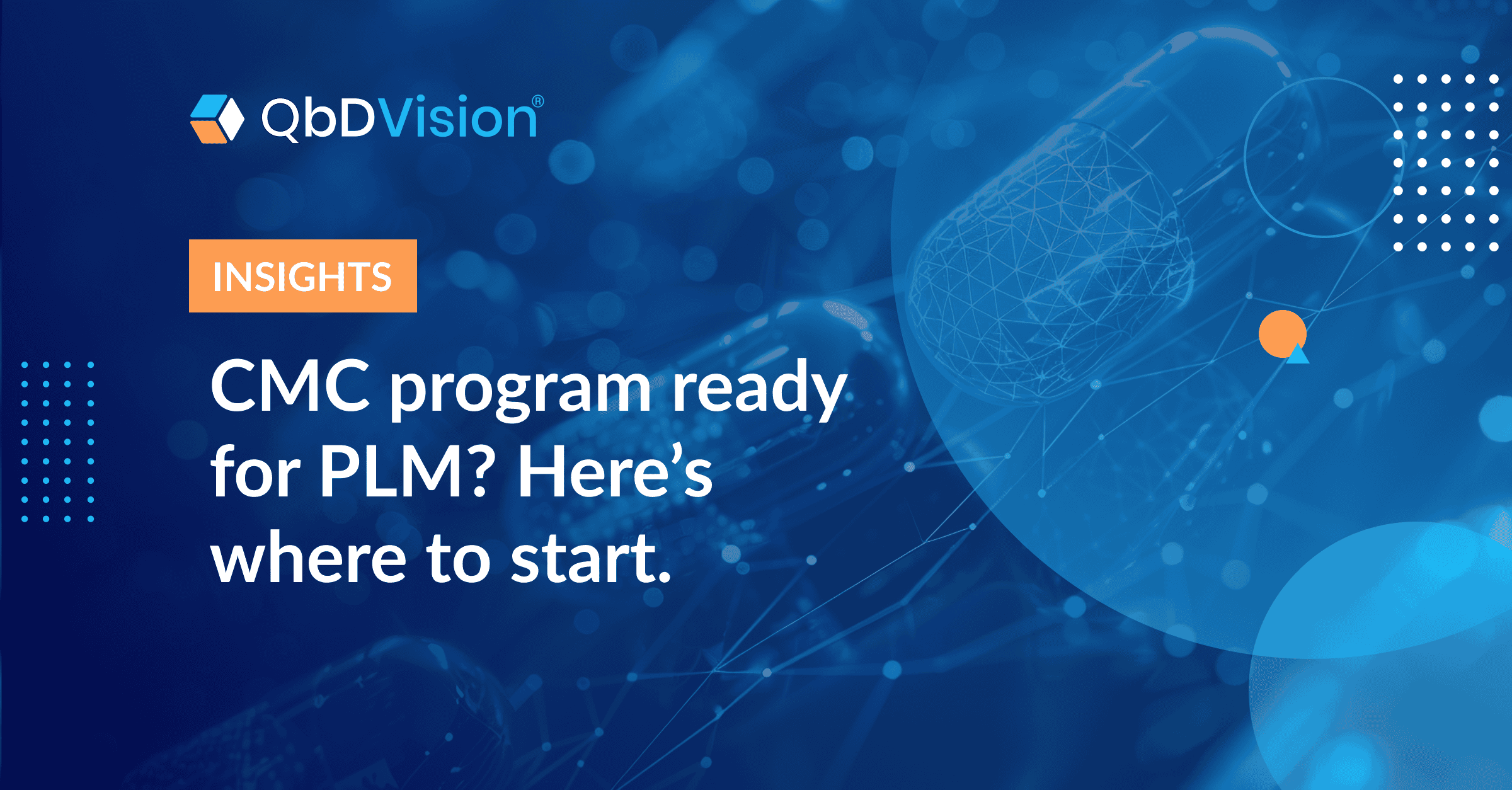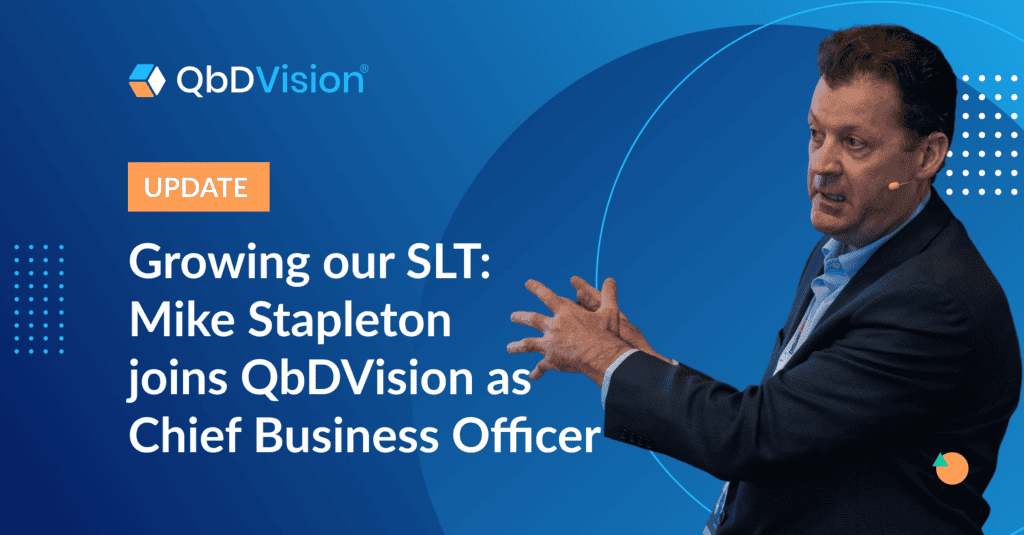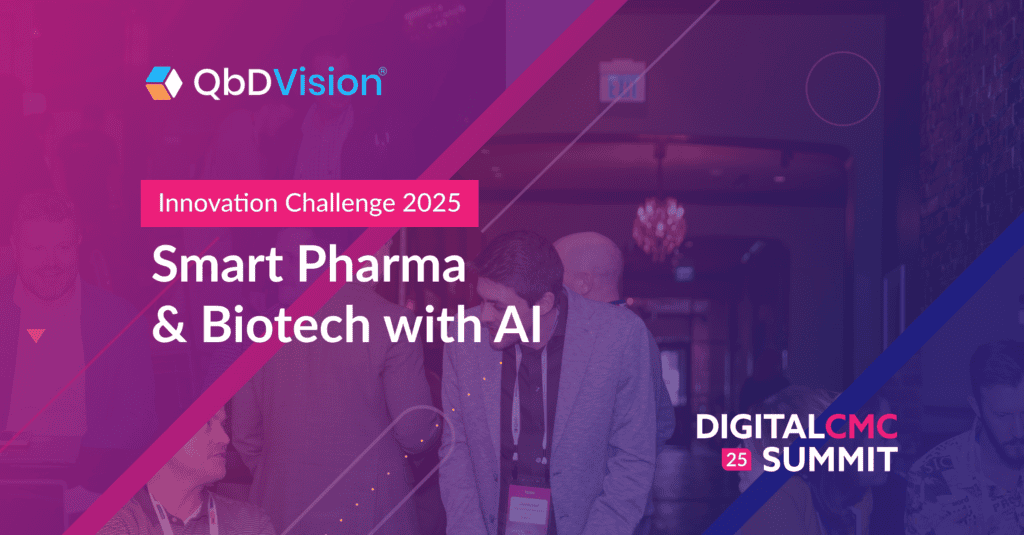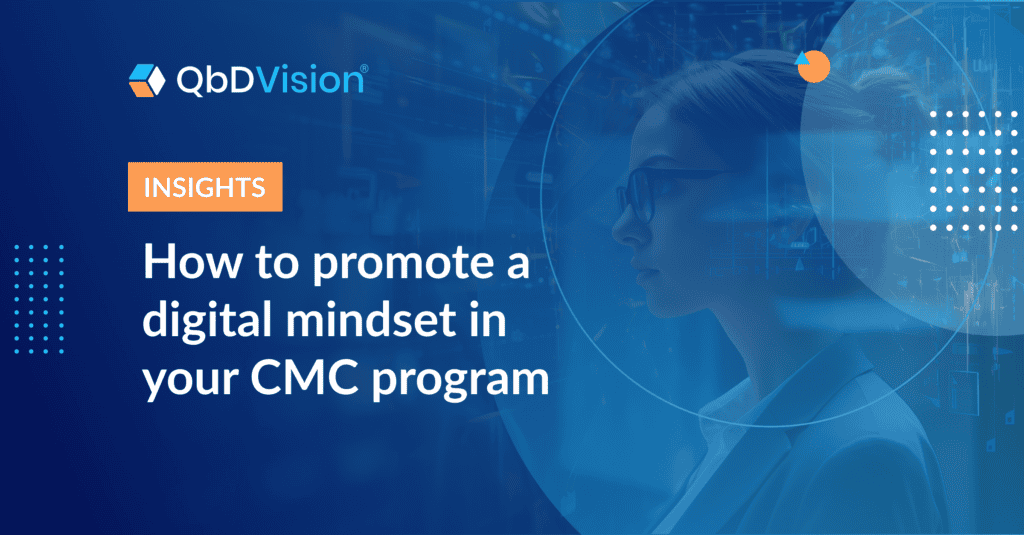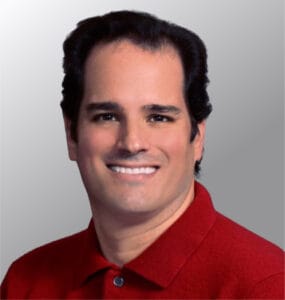Product lifecycle management (PLM) is poised to revolutionize the development cycle.
“The life cycle” is a ubiquitous concept for much of the life sciences industry. There are many well-established approaches to managing one. Lifecycle management gets special attention in ICH Q12. It has a diverse ecosystem of solutions and technologies to enable it.
For many development teams, though, PLM is often seen as more of a theoretical business concept than a solution to the data deluge swamping today’s CMC programs. Even as that flood gets deeper and deeper, traditional PLM systems have gained little traction with drug developers drowning in their unmanaged data lakes.
So why not? Why have drug development programs been slow to adopt PLM? And what could help them unlock its benefits?
Very glad you asked. Let’s take a look.
Discrete vs Process-Based Manufacturing
The main reason for low PLM adoption in drug development: Most industries and disciplines that deploy traditional PLM solutions have fundamentally different manufacturing needs.
Take any of the 50 industries that have left pharma in the digital dust over the last decade – Aerospace, Automotive, you name it – and you’ll find no shortage of PLM deployments. Many top 50 life science organizations also use platforms like Oracle and SAP to manage commercial-stage manufacturing processes.
But whether these organizations produce passenger jets, smartphones, or doses of a GLP-1, they all have one thing in common: a focus on discrete manufacturing with distinct outputs, locked parameters, and a heavy emphasis on supply chain management.
Sound like many CMC programs you know?
The main reason for low PLM adoption in drug development: Most industries and disciplines that deploy traditional PLM solutions have fundamentally different manufacturing needs.
The PLM platforms these organizations use are simply too rigid and protocol-dependent for scenarios where parameters are still being defined, characterization is just ramping up, and the team is still figuring it out. Jam those workflows into a traditional PLM system, and you’ll know exactly how it feels to stuff yourself into XS Lululemon leggings right after Christmas dinner.
No, while development and commercial manufacturing may be two stages of the same life cycle, they have vastly different lifecycle management needs. Therein lies the rub – and not just those lycra legs scraping each other – when it comes to extending the PLM concept to pre-commercial workflows.
Closing the PLM gap: Where should drug developers begin?
At this point, we might fairly ask: Where does a PLM solution need to kick in for it to be considered a true “life cycle” solution?
Today, many of the “PLM” solutions used in the life sciences are actually blind to large, fundamental phases of a drug’s evolution. Many – if not most – commercial manufacturing processes run off a predefined recipe with minimal access to the development history and scientific rationale underlying the final recipe selections. It’s this all-too-common gap that must be closed to unlock truly comprehensive PLM for drug products.
And there’s just one place to start: drug development data.
Today’s development teams – and their document-centric processes – are drowning in petabytes of information they have no hope of absorbing, much less leveraging. CMC programs are now treading water at a crossroads: modernize how they manage their ever-accumulating data, or continue perpetuating alarmingly low levels of efficiency and effectiveness.
The top 50 are quickly realizing that this isn’t a choice: it’s an imperative. Three-sixty knowledge management isn’t a when-you-get-to-it operational refinement; it’s essential to predictably efficient development processes. And for that, you need an effective approach to PLM.
If that’s on the roadmap for your organization, I’m excited to share some thoughts on what you can expect and how to set yourself up for success. Let’s take a look at how to prepare for pre-commercial PLM, and how to evaluate today’s rapidly evolving options.
Before you adopt a PLM system, start with the data that will power it.
By now, the benefits of pre-commercial PLM need little introduction: holistically managing the development cycle and its data can help accelerate key workflows, maximize program productivity, and save organizations millions in overhead costs.
But all these transformational opportunities have a catch: They all rely on a consistent, program-wide flow of structured, contextualized data. Without that flow…
Well, to put it in colloquial terms: “Sh*te in, sh*te out.”
All that to say: to achieve success with a pre-commercial PLM system, you first need to start by optimizing the data that will power that system. Most importantly, setting up a consistent contextual framework that’s aligned with the scientific, quality, and regulatory standards that define the drug development pathway.
To effectively power a pre-commercial PLM system, that structure should clearly and globally define both the product you’re making and the manufacturing processes that support it – from CQAs to unit operations, steps, process parameters, materials, material attributes, and equipment. All with integrated QRM and their own rich set of contextualizing metadata for each attribute, parameter, and object.
To achieve success with a pre-commercial PLM system, you first need to start by optimizing the data that will power that system. Most importantly, setting up a consistent contextual framework that’s aligned with the scientific, quality, and regulatory standards that define the drug development pathway.
This structure and context is key: ultimately, when your PLM system is in place, this framework will be the source for data that flows between teams and tools throughout your organization. You wouldn’t introduce a new material to a bioreactor without knowing its pH, osmolality, and oxygenating properties. Nor do you want low-quality, unstructured, de-contextualized data flowing from your knowledge management system to your LIMS, MES, or QMS.
But don’t sweat the budget you’ll need for a data science team. Today, CMC programs can implement this kind of holistically structured data framework with specialized, off-the-shelf solutions like QbDVision. It’s an essential step before moving ahead with any pre-commercial PLM strategy, or any tools you’ll use to implement it.
But while that framework will be the informational backbone of your PLM system, it won’t be the only groundwork you need to lay to support that system’s success. Here’s a quick look at what to plan for before your rollout.
Pre-implementation planning: What should be on your PLM roadmap
So you’ve implemented a global, contextual, and QRM-centric framework for your CMC data. Big, essential box checked! Now your PLM engine has the high-quality fuel it needs to become your engine of efficient, effective development.
Next big questions: How does your organization need that engine to run, who will be responsible for running it, and what should your workforce be prepared for when the engine revs up?
There are a few important steps to take to ensure you know the answers:
1. Assess your company’s specific needs
No two development cycles are exactly the same. Workflows for a small molecule will look wildly different from those for a personalizable gene therapy. Same for organizations with comprehensive in-house resources and those with a robust network of outsourced development partners.
Before you launch your pre-commercial PLM system, make sure you have a detailed idea of what workflows you’ll need it to support, where your data flows will need to reach, and how each group of stakeholders will expect to access your development knowledge. Knowing all these parameters will help ensure your system is set up to meet your exact needs.
2. Build a cross-functional implementation team
Today’s drug development cycle is an intensively multidisciplinary endeavor. Your CMC workflows likely have contributors from at least process development, analytics, MSAT, Quality, Regulatory, Materials, and IT. And that’s the short list.
When you assemble the team responsible for your PLM initiative, be selective but comprehensive: you need a group that’s compact enough to move efficiently but holistic enough to represent all the stakeholders who’ll be impacted by rollout.
3. Make a change management plan
It’s no secret: Adopting PLM-driven knowledge management may be a big and uncomfortable shift for a lot of your stakeholders. Especially those who may be heavily invested in legacy systems and document-centric processes.
Before you launch a PLM system to your team, it’s critically important to prepare, educate, and incentivize them. Like all transformation initiatives, this one will live and die by your colleagues’ willingness to try it, use it, and stick with it – and that all comes down to how well you communicate, manage, and guide them through the change they’ll experience.
4. Carefully vet potential PLM partners
PLM is a specialized arena with a fast-growing and rapidly evolving tech stack. You may find yourself evaluating a range of different tools and their supporting teams, from enterprise-scale platforms with pre-commercial widgets to more narrowly focused solutions with some extensible PLM capabilities.
When you assess these options, ask questions, ask a few more, then ask a few others: How do they handle development data? How well do they integrate with other solutions? What’s their cybersecurity posture? How do they ensure the security of your IP?
Get clear, comprehensive answers before engaging. It can save you a lot of headaches downstream.
5. Build a comprehensive, collaborative implementation plan
Once you’ve found the right PLM partner, they won’t simply ship you a pre-commercial PLM platform. They’ll work closely with you to build a step-by-step plan for customization, pilot testing, and company-wide rollout.
One key part of this plan will be a strategy for data migration and system integration.
Unless you’re a brand-new drug development organization with a green field of product and process data – we love you too!! – you’ll have a lot of existing and historical knowledge resources that will need to be transposed to your new pre-commercial PLM system and its data framework. A smart PLM partner will help guide you through every step of that process.
Today’s pre-commercial PLM options come in many forms. Here’s what to know about them.
So lots to do to prepare for the starting line! But what kind of platform do you want to have with you there??
Excellent question – and one you can answer a few different ways.
Like any evolving software ecosystem, there are a lot of ways in which the pre-commercial PLM tech stack is “still figuring out who it wants to be.” Solutions in that stack can come in many different configurations, so you’ll want to take a close look at each one’s advantages and limitations.
First off, though, it’s important to understand the full range of capabilities you’ll ultimately need from a PLM system – so you can determine the best way to source and implement them all. A comprehensive PLM system should enable you to manage:
Design
Via a workspace customized for your process design and development workflows
Documentation
Especially an audit-ready chain of versions, changes, and justifications
Quality & compliance
With a focus on opportunities for continuous improvement and regulatory readiness
Program planning & projects
Including stages, gates, and milestones on your critical path to market
Recipes
An essential resource that will continually evolve throughout your CMC program
Reporting
Via a comprehensive library of risk analyses, FMEA, compliance documents, and more
Requirements
Centralizing key assets like your TPP and qTPP, along with all their atomized components
Program planning & projects
Including stages, gates, and milestones on your critical path to market
That’s a diverse and sophisticated array of functions – and one, admittedly, that pre-commercial solutions are still evolving toward. Today, most pre-commercial PLM tools come in one of three forms, each with different advantages:
Enterprise platforms with pre-commercial modules
In recent years, numerous large, commercial- and manufacturing-focused platforms have extended their capabilities by adding components or special functions focused specifically on pre-commercial workflows.
If your organization already uses one of these platforms, it can be easy and convenient to extend its capabilities by adding pre-commercial modules. But in many cases, those modules are retrofitted from other platform functions, rather than purposefully designed for earlier-stage workflows.
Point solutions with some pre-commercial capabilities
Some narrowly-focused solutions for other use cases may offer capabilities that overlap with those that make up a PLM system. For example, eQMS tools offer robust document management capabilities and ERP systems provide extensive program planning functionality – though neither is designed for PLM.
If needed, these overlapping functions can be used to meet some PLM needs. But tools optimized for specific non-PLM functions will rarely be a replacement for a true PLM system.
Digital CMC solutions designed for ready integration
This type of solution is purpose-built to provide the backbone infrastructure of pre-commercial PLM – effective, comprehensive knowledge management – while readily integrating with other tools that leverage that data for specific purposes (including LIMS, MES, ERP, and more).
Thanks to this versatile integrability, this class of solution is often a smart starting point for new pre-commercial PLM systems. It provides a strong, data-centric foundation that can be extended by a range of other tools and functions.
The “con”: Today, there’s only one solution that provides this unique capability. But as numerous top drug developers can attest, that one solution can be the lynchpin for an entire connected, continuous CMC ecosystem – one that spans the entire development cycle and beyond.
But however you decide to consolidate all the functions of a PLM system, there’s substantial value waiting to be captured through that investment. So what’s the next step toward unlocking it?
Let’s start shaping your path to pre-commercial PLM.
By “substantial value,” we mean real 7-figure impact: a conservative model shows that investment in a Digital CMC solution can deliver personnel costs savings of $4.3M and manufacturing costs savings of $2.2M over a typical 7-year development cycle. A tidy 114% ROI!
To capture that return, though, we need to finally turn the page on yesterday’s CMC processes and fully refocus on today’s data-centric development principles. That’s the first essential step on a path that leads to greater efficiency, higher productivity, and accelerated results throughout the development cycle. All it takes is the right data framework – one that’s built for the iterative, evolutionary, and, yes, scientific realities of the development process.
Let’s definitely chat when you’re ready to take a look at one!
GET IN TOUCH
Ready to see QbDVision in action?
Connect with our team to schedule a QbDVision demo and see how our platform can transform your knowledge management strategies.
